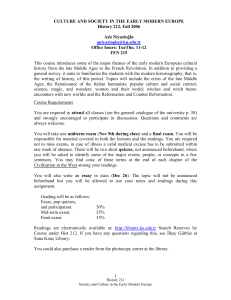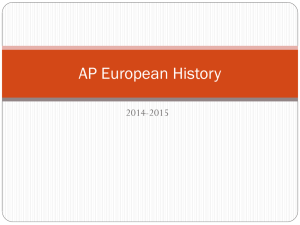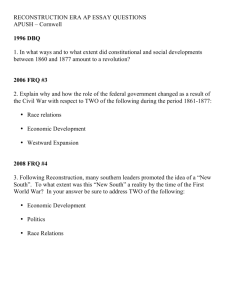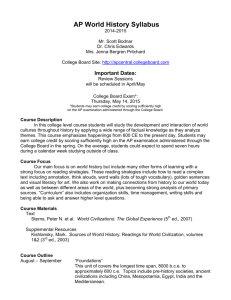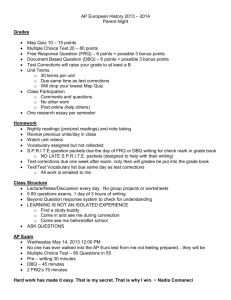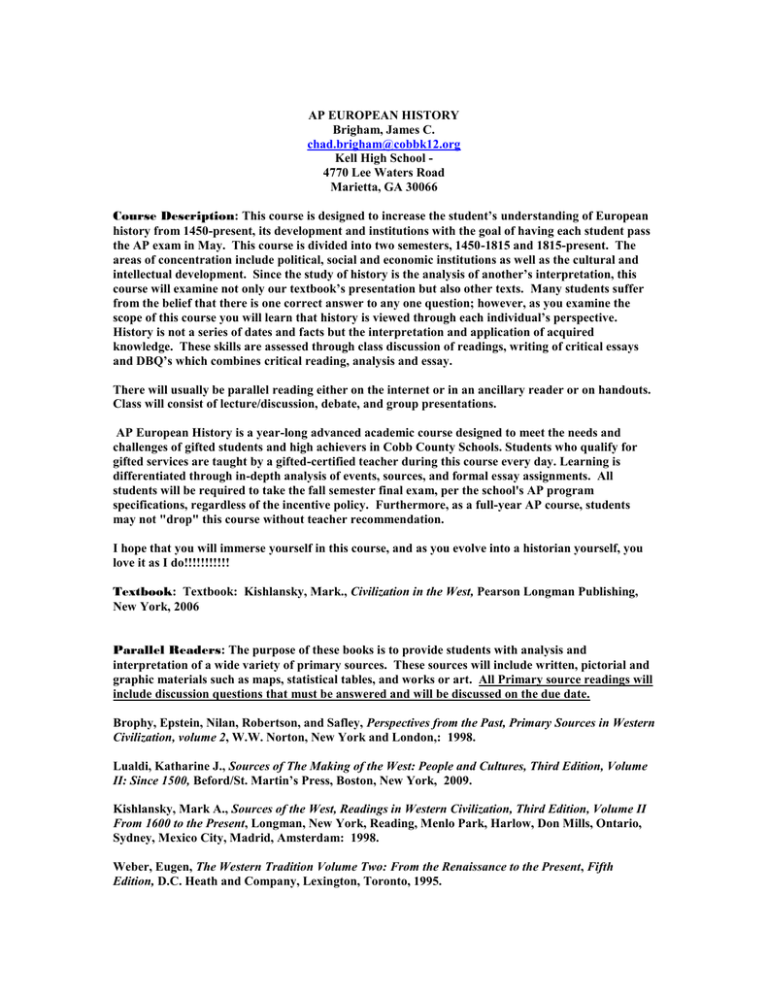
AP EUROPEAN HISTORY
Brigham, James C.
chad.brigham@cobbk12.org
Kell High School 4770 Lee Waters Road
Marietta, GA 30066
Course Description: This course is designed to increase the student’s understanding of European
history from 1450-present, its development and institutions with the goal of having each student pass
the AP exam in May. This course is divided into two semesters, 1450-1815 and 1815-present. The
areas of concentration include political, social and economic institutions as well as the cultural and
intellectual development. Since the study of history is the analysis of another’s interpretation, this
course will examine not only our textbook’s presentation but also other texts. Many students suffer
from the belief that there is one correct answer to any one question; however, as you examine the
scope of this course you will learn that history is viewed through each individual’s perspective.
History is not a series of dates and facts but the interpretation and application of acquired
knowledge. These skills are assessed through class discussion of readings, writing of critical essays
and DBQ’s which combines critical reading, analysis and essay.
There will usually be parallel reading either on the internet or in an ancillary reader or on handouts.
Class will consist of lecture/discussion, debate, and group presentations.
AP European History is a year-long advanced academic course designed to meet the needs and
challenges of gifted students and high achievers in Cobb County Schools. Students who qualify for
gifted services are taught by a gifted-certified teacher during this course every day. Learning is
differentiated through in-depth analysis of events, sources, and formal essay assignments. All
students will be required to take the fall semester final exam, per the school's AP program
specifications, regardless of the incentive policy. Furthermore, as a full-year AP course, students
may not "drop" this course without teacher recommendation.
I hope that you will immerse yourself in this course, and as you evolve into a historian yourself, you
love it as I do!!!!!!!!!!!
Textbook: Textbook: Kishlansky, Mark., Civilization in the West, Pearson Longman Publishing,
New York, 2006
Parallel Readers: The purpose of these books is to provide students with analysis and
interpretation of a wide variety of primary sources. These sources will include written, pictorial and
graphic materials such as maps, statistical tables, and works or art. All Primary source readings will
include discussion questions that must be answered and will be discussed on the due date.
Brophy, Epstein, Nilan, Robertson, and Safley, Perspectives from the Past, Primary Sources in Western
Civilization, volume 2, W.W. Norton, New York and London,: 1998.
Lualdi, Katharine J., Sources of The Making of the West: People and Cultures, Third Edition, Volume
II: Since 1500, Beford/St. Martin’s Press, Boston, New York, 2009.
Kishlansky, Mark A., Sources of the West, Readings in Western Civilization, Third Edition, Volume II
From 1600 to the Present, Longman, New York, Reading, Menlo Park, Harlow, Don Mills, Ontario,
Sydney, Mexico City, Madrid, Amsterdam: 1998.
Weber, Eugen, The Western Tradition Volume Two: From the Renaissance to the Present, Fifth
Edition, D.C. Heath and Company, Lexington, Toronto, 1995.
Rogers, Perry M., Aspects of Western Civilization Volumes I and II, Prentice Hall, Englewood Cliffs,
New Jersey: 1992.
Required Parallel Reading beyond the readers:
The Prince
Candide
The Gods Will Have Blood
Germinal
The Long Walk
Machiavelli
Voltaire
Anatole France
Emile Zola
Slavomir Rawicz
Units of study for First Semester:
I.
Introduction: Kishlansky, introduction and Chapter 10. DBQ: Plague.
Primary Source Reading: 1) A Plague Doctor, Carlo M. Cipolla, 2) Boccaccio Describes the
Ravages of the Black Death in Florence, Boccaccio
II.
Renaissance and Reformation: Kishlansky Chapter 11, 13 and 14 video: The Day the
Universe Changed: Point of View. FRQs: 1) Humanism in Art, (you will be
required to include the analysis of at least 4 works or art) and 2) The Prince.
Primary Source Reading : 1. Letters, Francesco Petrarca, 2) On the Family, Leon Battista Alberti, 3)
The Life of Leonardo da Vinci, Giorgio Vasari 4) The Prince, Machiavelli (entire work) 5) In Praise of
Folly, Erasmus, 6)Utopia, Sir Thomas More, 7) The Freedom of a Christian, and Of Marriage and
Celibacy, Martin Luther, 8) Institutes of the Christian Religion, and Catechism, John Calvin, 9)
Spiritual Exercises, Ignatius Loyola, 10) The Life of Saint Teresa, Teresa of Avila 11) The Edict of
Nantes, Henry IV, 12) The Political Testament, Cardinal Richelieu
III.
Age of discovery: Kishlansky Chapter 12, pages 353-366.
Primary Source Reading: 1. Letters from the First Voyage, Christopher Columbus, 2) Travels,
Ludovico di Varthema, 3) Apologetic History of the Indes, Bartolome de las Casas, 4) The True
History of the Conquest of New Spain, Bernal Diaz.
IV.
Absolutism / Limited Monarchy: Kishlansky, Chapters 12 (Pages 367-387), 15, and 16.
FRQ: On development of Absolutism, DBQ: Dutch Revolt
Primary Source Reading: 1) True Law of a Free Monarch, James I, 2) A Defense of Liberty Against
Tyrants, Philippe Duplessis-Mornay, 3) The Putney Debates, Sir William Clarke, 4) Leviathan, Thomas
Hobbes, 5) Second Treatise of Government, John Locke
V.
Scientific Revolution and the Enlightenment: Kishlansky Chapter17 -19. DBQ:
Scientific Revolution. FRQ: Analyze the ways in which Enlightenment
thought addressed religious beliefs and social issues in the 18 th century.
Primary Source Reading: Kishlansky Reader pages 49-58(Galileo, Descartes), from The Discourse
upon Method, Descartes, from The Mathematical Principles of Natural Philosophy, Isaac Newton.
Kishlansky Reader pages 85-109 ( Voltaire, Rousseau, Montesquieu, Beccaria, Condorcet), 32
Problems in World History: Locke and Rousseau on Social Contract, Perspectives from the Past 118124, 146-157.
VI.
French Revolution and Napoleon and Congress of Vienna: Kishlansky Chapter 20.
FRQs: 1)“Napoleon was a child of the Enlightenment.” Assess the validity
of the statement. Use examples referring both to specific aspects of the
Enlightenment and to Napoleon’s policies and attitudes. 2) “The Gods
Will Have Blood”.
Primary Source Reading: Kishlansky Reader pages 110-129 ( Burke, Sieyes, de Gouges,
Walter), What is the Third Estate, Abbe Sieyes, The People under the Old Regime: Political
Cartoons, various artists, The Declaration of the Rights of Man and the Citizen, National
Assembly, Report on the Principles of Political Morality, Robespierre, Revolution in the Colonies,
Toussaint L’Ouverture, Results of the Congress Laybach, Metternich, The Gods Will Have Blood,
Anatole France (entire Novel).
Second Semester:
I.
Isms: (Industrialism, Nationalism, socialism, realism, romanticism, liberalism, and
anarchism): Kishlansky Chapters 21 and 22. FRQ: Discuss the impact of art on
nationalism using at least 4 works of art. DBQ: Industrialism.
Primary Source Reading: Perspectives from the Past chapters 19-20, Kishlansky Reader pages
131-151, and 182-195.
II.
Mass Politics: Kishlansky chapter 23. FRQ: Germinal
Primary Source Reading: Perspectives from the Past chapters 23-24, Germinal (entire work) Emile
Zola.
III.
Imperialism: Kishlansky Chapters 24 and 25. DBQ: Imperialism
Primary Source Reading: Kishlansky Reader pages 512-531 (Hobson, Kipling, Rhodes, Orwell),
as well as analyzing maps of Africa and Asia pre and post Imperialism.
IV.
WWI and Russian Revolution: Kishlansky Chapter 26 DBQ: Germany in 1914.
Primary Source Reading: Perspectives from the Past chapter 26, Handout on Diplomacy by
Henry Kissinger, 32 Problems in World History problems 25 and 26.
V.
Interbella 1919-1939: Kishlansky Chapter 27. FRQ: Analyze the impact of WWI
on European culture and society 1919-1939 (use at least 2 works of art
and 2 examples from science and technology.
Primary Source Reading: Perspectives from the Past chapter 27 ( Mussolini, Hitler, Freud,
Einstein, T.S. Eliot).
VI.
WWII: Kishlansky chapter 28. FRQ: The Long Walk
Primary Source Reading: Sources of the Making of the West Chapter 26, The Long Walk,
Slavomir Rawicz (entire work).
VII.
Cold War Era 1945-1970: Kishlansky Chapter 29. DBQ: EU
Primary Source Reading: Sources of the Making of the West Chapter 27.
VIII.
Contemporary Europe: Kishlansky Chapter 30. FRQ: Compare and contrast
the economic and political policies of Stalin before WWII and those of
Gorbachev (1985-1991) and many historians have suggested that since
1945, nationalism has been on the decline in Europe. Using both political
and economic examples from the period 1945-2000 evaluate the validity
of this interpretation.
Primary Source Reading: Sources of the Making of the West Chapter 28 and 29, Kishlansky
Reader pages 306-318, selections from the Treaty of Rome and Treaty of Maastricht.
Students will be responsible for completing a Unit Review for each of the above units. These will
need to be typed and handed in on test days. The format for the Unit Reviews is:
Unit Name _______________________________________________________________
Time Frame [in years and centuries] __________________________________________
DIRECTIONS: As completely as possible, answer each of the following questions. Be as detailed as
necessary. Answers must be typed. Occasionally one of the questions will not fit the unit covered you are to
omit this question but retain the same numbers listed below and omit the number as well as the questions
asked. You are being graded on your ability to analyze and interpret the evidence provided in the assigned
readings, as well as the in-depth class discussions.
1.
2.
3.
4.
5.
6.
7.
8.
9.
Define the name of the unit [This should be 5-6 sentences with a definition that is complete]
What is [are] the primary contributions of the period to the course of modern history? [name them
and give an explanation]
If you were a man on the streets during this time period what would be the vocabulary terms you
would hear most? [ex. Today you would hear CD, text messaging, e-mail]
What are the greatest political events of the time period? [name and explain]
What is the prevailing political theory of the time and who is its spokesman? [ex. Absolutism]
Who are the philosophical spokesmen of the time? What is their point of view and what did they
write if anything?
What is the greatest social issue of the time? Who is the leader of the movement and what is the
outcome of this movement? [note whether it began earlier than this unit or if it continues past]
What is the scientific movement of the time? Who represents this movement and what did he
[they] do?
What are the cultural advances or changes of the times? Who are the leaders of this movement?
[include art, literature, music]
Grading: Test Days=Tuesday, Thursday
Grade Break Down
Tests
Essays (Expect much stricter guidelines as we approach exam)
Projects
Assignments
40%
30%
15%
15%
Make-up: According to guidelines in the student handbook.
Materials: Textbook, pen/pencil, loose-leaf notebook.
As AP European history is the equivalent of a college course, all components of the
course must be completed to receive credit for the course on your transcript. This means
that all students MUST take the AP European history test at the end of the year or they will
receive credit for AP European history on their official transcripts.
MATERIALS NEEDED
Students are required to have the following items for class:
1. A 3-ring binder/organizer.
2. Paper, pens (black or blue-I prefer black) and pencils. I do not allow any light colored pens
to be used for work that needs to be turned in.
3. Assignment book/planner/organizer. Actual type is up to student discretion.
CLASSROOM RULES
1. The instructor reserves the right to modify, amend or otherwise change the classroom
rules at any time and for any reason.
2. Hall passes and/or Restroom passes will not normally be authorized during the first
and last ten minutes of class. Restroom passes will be allowed during any other time
in class (with the exception of during testing). Exceptions, when allowed, will be
handled on a case-by-case basis. If granted, a pass from the school nurse will be
needed to avoid possible disciplinary action.
If a student is authorized to leave the room—for any reason—they must have a
current school issued identification card (in accordance with school policy).
3. Students are to be in their assigned seats at the class bell. Instructive activities will
commence immediately after the attendance is taken.
4. All students are required to use their classroom time engaged in academic pursuits.
Behaviors that are strictly forbidden include but are not limited to sleeping in class,
class disruptions, non-academic conversations, putting on make-up, card-playing and
any other behavior that in the opinion of the instructor is a failure to properly utilize
academic time. Violations of this policy will be referred for disciplinary action.
5. Homework, Projects, Reading Assignments and other outside-of-class activities will
be given on a regular basis. Items will be collected on the date due at the beginning
of the class with no exception. YOU HAVE NO EXCUSE FOR NOT TURNING IN
YOUR WORK! In accordance with Departmental policy, late work will be accepted
with penalty (10% deduction of points up to 50% maximum available credit if turned
in within ten (10) days of due date with NO points available after the ten (10) day
grace period. Missed work (with an excused absence) can be made up within a
maximum of five (5) days after due date.
6. SLEEPING OR ANY OTHER FORM OF UNATTENTIVENESS WILL NOT
BE TOLERATED. Students that repeatedly violate this policy will be referred for
disciplinary action that could include withdrawal from the class.
7. In accordance with district and school policy, no student is authorized to possess
or use any electronic device that is not primarily of an educational nature (such
as cell phones, pagers, CD players, MP3 players, handheld gaming devices, etc.)
during instructional time. Any student found to be in violation of this policy will
be punished as per the policies outlined in the Cobb County School District
Administrative Rules.
8. All students are to abide by standards of conduct, dress and deportment as found in
the student handbook.
STUDENT EXPECTATIONS
In addition to the aforementioned policies, students are expected to abide by the following:
Students are to arrive in class prepared for learning.
Students will bring their textbook, notebook, and a number two pencil to class EVERY day.
Students are to afford their classmates the respect and dignity that they are entitled to.
Any student requiring any type of assessment validation for extra-curricular activities will be
able to procure this BEFORE school only! I am a very busy person and I AM NOT
AVAILABLE FOR ANY REASON DURING CLASS TIME OR ADVISORY PERIOD!
THEREFORE, YOU MUST MAKE AN APPOINTMENT WITH ME AT MY
CONVENIENCE! If you show up to my classroom without an appointment, you will be
denied access!
School property is to be treated with care. Any form of vandalism will result in severe
disciplinary action.
Substitute Teachers will be afforded respect and dignity. Negative behavior towards or in the
presence of a substitute teacher will be handled in a harsher manner than under normal
circumstances.
"No-name policy"
Any assignment turned in without a name will be discarded and no attempt will be made by the
instructor to ascertain authorship. If it does not have a name, it is the same as not turning in the
assignment. All assignments shall have the student’s name clearly written, along with class
section and date in the upper right hand corner (unless otherwise instructed). This applies to ALL
assignments (Homework, Quizzes, Tests, Papers, Final Examination, etc.) The instructor will
attempt to remind ALL students before accepting work but it is the STUDENT’S responsibility to
verify that their name is on EACH item turned in.
------------------------------------------------------------------------------------------------------------
I have read the course syllabus and understand the rules and
procedures for Mr. Brigham’s World History class.
____________________________________________
Student Signature
____________________________________________
Parent/Guardian Signature
Contact Information:
Name of Student___________________________________________
Address______________________________________________________
_________
Student phone number________________________________________
Parent phone number__________________________________________
Parent
email____________________________________________________


